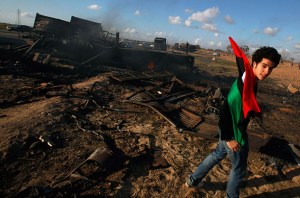Michael Crowley pointed yesterday to national security adviser Tom Donilon’s struggles to distinguish between “rebels,” who U.S. forces are not supposed to protect in Libya, and a “civilians,” who U.S. forces are charged with protecting. In his comments Tuesday, Donilon seemed at pains to avoid drawing any clear lines of distinction between the two.
Later on Monday, U.S. Gen. Carter Ham, the commander of AFRICOM, gave a much more candid response to a similar question. “It’s a very problematic situation,” he said–as Mark Thompson pointed out yesterday.
[Update: Apologies for the double post. I had not seen Thompson’s original piece on this yesterday, which is better for many reasons, including the fact that it lacks a Potter Stewart/hard-core pornography reference. As Thompson told me, I have created a Ham sandwich on Swampland.]
While the U.S. mission is clear–protect civilians, not rebel fighters–the meaning of this mandate on the ground is a bit more blurry. Here is the key parts from the transcript:
Q: As you go after the regime’s ground forces, to what degree can it really be said that you’re not providing close air support for the opposition, even if you’re not being in contact with them?
GEN. HAM: We do not provide close air support for the opposition forces. We protect civilians. Some — I suspect some would argue that some within the opposition may be civilians. And if they are attacked by regime forces, then we would be obliged, if we possess the capability, to try to protect them from attack. But we have no mission and no intent to provide close air support to the opposition. . . .
Q: Don’t you define, even now, rebel forces who are in Benghazi as civilians, in effect? I mean, if there were attacks on men holding guns who are rebel forces, would you not protect them?
GEN. HAM: It gets a little bit into some very specific parsing of this question because, again, who exactly is this opposition. It’s clear to me simply from watching the reports from many of the organizations that are represented in that room that many in the opposition truly are civilians, and they are trying to protect their homes, their families, their businesses. And in doing that, some of them have taken up arms, but they are — but they’re basically civilians trying to protect their civilian lives, businesses and families.
There are also — again, having seen reports from many of the organizations in that room, there are also those in the opposition that have armored vehicles and that have heavy weapons. To me, that says that, you know, they — those entities and those parts of the opposition are — I would argue, are no longer covered under that protect-civilian clause. So it’s a — it’s not a clear distinction, because we’re not talking about a regular military force. It’s a very problematic situation.
What we try to do and what we are charged with doing is when there are threats to the civilian populous, we are obliged under the mission and under the Security Council resolution to try to protect them. Again, you know, sometimes this — these are situations that brief much better at a headquarters than they do in the cockpit of an aircraft.
What we have — instructions that we have given to our crews, to include down to the kneeboard information that they have, is to be very judicious in their application of force. Where they — where they see a clear situation where civilians are threatened, then they are authorized to, and they have in the past taken action to protect those civilians. If it’s a situation where it’s unclear that it is civilians who may be being attacked, then those aircrews are under instruction to be very cautious and not apply military force, again, unless they are convinced that doing so would be consistent with their mission to protect civilians.
In other words, the military definition of “civilian” in Libya tends to borrow a bit from as Chief Justice Potter Stewart’s old line about hard-core pornography–“I know it when I see it”–though such judgements certainly are easier to make in the courtroom than on the battlefield. As Ham put it, “These are situations that brief much better at a headquarters than they do in the cockpit of an aircraft.” Such a frank admission should build confidence in Ham’s commitment to transparency, even as it raises real questions about how well-defined the Libyan mission has become.
MORE: If you missed it, Mark Thompson has a better explanation of the broader challenges, including the civilian/rebel issue, here.


